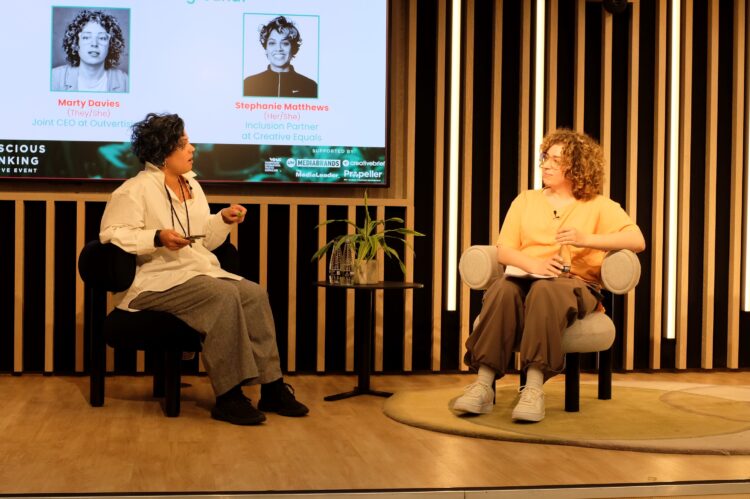‘You should plan as if you will get backlash’: Outvertising boss warning


“I fear that over the next 12 months we’ll see less visible representation.”
Outvertising joint-CEO Marty Davies, told a crowd at the Conscious Advertising Network’s (CAN) Conscious Thinking Live event last week that in response to right-wing political and media backlash to inclusive ad campaigns, advertisers are booking less queer and trans talent.
Speaking to Creative Equals client business partner Stephanie Matthews, Davies explained risk-conscious brands have failed the trans community at a time of great need.
Davies also criticised media trade publications for failing to adequately interrogate advertisers for their declining support for queer communities this year.
They called attention to this summer’s controversy involving Anheuser-Busch InBev brand Bud Light. The beer brand had given promotional cans of beer to trans influencer Dylan Mulvaney; when a far-right backlash against the brand supporting the trans community ensued, Bud Light caved to pressure and backtracked on support for the trans community.
According to Davies, this led to a “double boycott” wherein the LGBTQ+ community and its allies then protested the purchase of Bud Light as well. Sales of Bud Light have since sunk; Anheuser-Busch InBev reported a 13.5% decline in revenue in the third quarter this year, prompting their chief marketing officer Benoit Garbe to resign.
Mulvaney, however, received the shorter end of the stick. The TikTok influencer was inundated with death threats following her promotion of Bud Light, and she reported receiving no contact or support from Bud Light as the brand sought to distance itself from her.
The debacle raised “duty of care” issues for brands, said Davies, who contrasted Bud Light’s handling of the situation with Nike, who subsequently partnered with Mulvaney in promoting its line of sports bras. Nike, too, received transphobic backlash, but was prepared for it, did not backtrack, and instead provided necessary support for Mulvaney.
Given the soured political climate, Matthews noted some level of backlash is going to be inevitable for brands working with trans communities.
She said she hears from clients they are fearful and apprehensive of working with trans talent, believing doing so may negatively impact the company’s short-term share price. Creative Equals works with brands to develop “risk and resilience” programs to train staff and prepare a PR strategy before a campaign is launched in case backlash occurs.
“You should plan as if you will get backlash,” agreed Davies. “Get comfortable with it, because it’s very likely that you will. In this environment, even having a simple rainbow flag is seen as controversial now, somehow.”
Davies warned against considering any campaign delivery that seeks to court backlash for the purposes of attention, calling the practice exploitative. They also said brands should never pull campaigns in response to backlash, as doing so “erases a section of society from our media. That can never be okay.”
“Allyship is really about sitting in a community’s pain,” Davies continued. “It isn’t about running away when the going gets tough and there’s backlash. Trans people can’t not be trans people for a day. If you’re doing a campaign [with trans talent], you’re going to be in some pain. That’s part of it; just get used to it.”
